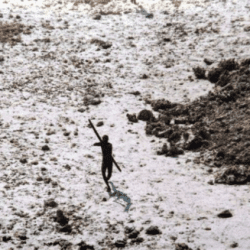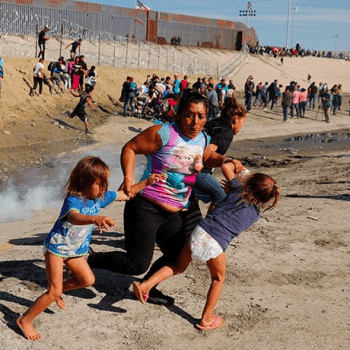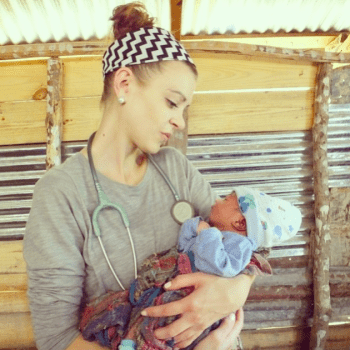Today, November 20th, is Universal Children’s Day. I woke up this morning thinking about the children in Togo we lost to malaria and tetanus and meningitis — but also the children who gave me joy and hope on my darkest days. Children in the developing world give us hope, and remind us that if we invest in them, they can create a better future for their communities and their countries.
***
There were a dozen little boys who gathered each Saturday to play soccer in an empty dirt lot just down the road from the hospital. On my first day Saturday off, I decided to take the mile-long walk from the hospital to the market at the center of the village.
As usual, when the little children in Mango saw a white person walking through their streets, they stopped what they were doing, pointed at me, and chanted “Bachuray”—a Tchakosi word that literally means “The Peeled One”—because to the Togolese, white people look like we’ve had our skin peeled off.
“BaCHUray! BaCHUray!” the kids yelled as I walked through the village on my way to the market, past the one-room mud-and-cinder-block houses, through the dirt streets where guinea fowl, chickens, and goats roamed.
More children ran to join the crowd at the side of the road, staring at me. Together they chanted, “BaCHUray! BaCHUray!” as they giggled.
I stopped and waved to them, and they jumped up and down as they waved back. Two little boys, who looked like they were about four years old, ran up to me and gave me high-fives. Then they examined their palms to see if something miraculous, or disastrous, had happened to them when they touched my white skin.
I laughed at their puzzled faces, and resumed walking until I came to the soccer field.
Twelve little boys were there, running around, using a tin can as their soccer ball. I stopped to wave at them, and they all ran over to me.
“We need a FIFA ball,” one of the older boys said in French. He meant that they wanted a real, leather soccer ball like professional soccer players used.
“Do they sell FIFA balls at the market?” I asked. I hadn’t seen any when I’d gone to the market before.
“Yah, Sarah, yah!” he nodded emphatically.
The littlest boy in the group got excited and ran around in a circle yelling, “Futbol! Futbol! Futbol!”
“Okay,” I said. “If you show me where they are, I’ll buy you a FIFA ball.”
The boy started giving me high-fives and hugging me. One of the older boys knelt down, took my hand, and kissed it.
I asked who wanted to walk to the market with me.
They all did.
As we started walking, the boys danced and skipped behind me as if I were the Pied Piper of futbol.
As we continued toward the market, my spirits began to lift, and I couldn’t help but smile as I experienced anticipation and joy instead of the dread and suffering that had become all too familiar to me.
Walking through the village with my entourage of FIFA Boys created something of a spectacle. As we walked on the main path that led through Mango, I noticed that the motorcycle mechanics stopped changing tires, the welders stopped welding, the women who were cooking stopped stirring their pots of boiling rice. They all stopped what they were doing and looked up at the crowd of boys who were running and skipping and laughing, with me, a Bachuray, in the center of it all.
I was worried that we would draw negative attention, that people would resent the interruption. But instead, the people who looked up began laughing and waving. Other children ran out of their homes and joined the parade.
I was glad that some of the kids who joined us were girls—whom I rarely ever saw playing outside because once they were old enough to help with chores, they spent nearly every waking hour helping their mothers around the house, or selling their family’s produce at the market. I was glad I had thought to bring the six-foot piece of rope from the welcome basket with me so I could teach the girls to jump rope if they didn’t want to play soccer.
One of the older boys led us to the stand in the market that sold FIFA balls. I paid twelve hundred CFAs, the equivalent of six dollars US, for a red-and-white-stitched leather ball. The boys were so excited, they immediately dropped it to the ground and began running and kicking it back and forth to each other.
Unfortunately, as we were walking from the market back to the soccer field, the girls who had joined us left the parade to return to their chores.
When we got to the field, the boys divided into two teams, fighting over which team got to have the Bachuray on their side. Eventually, we agreed that I’d play with one team for the first half of the game, and with the other team for the second half.
For the rest of the afternoon, I ran around the field with them, playing, laughing, and giving high-fives.
These boys—whom I nicknamed my FIFA Boys—were good for my soul. I couldn’t help but smile as I watched them skipping and laughing and running on the field, the littlest one who kept running circles around me, kicking a pretend ball, yelling, “Futbol! Futbol! Futbol!”
***
To offer hope to a child living in the developing world, visit www.compassion.com/sarahthebarge.















